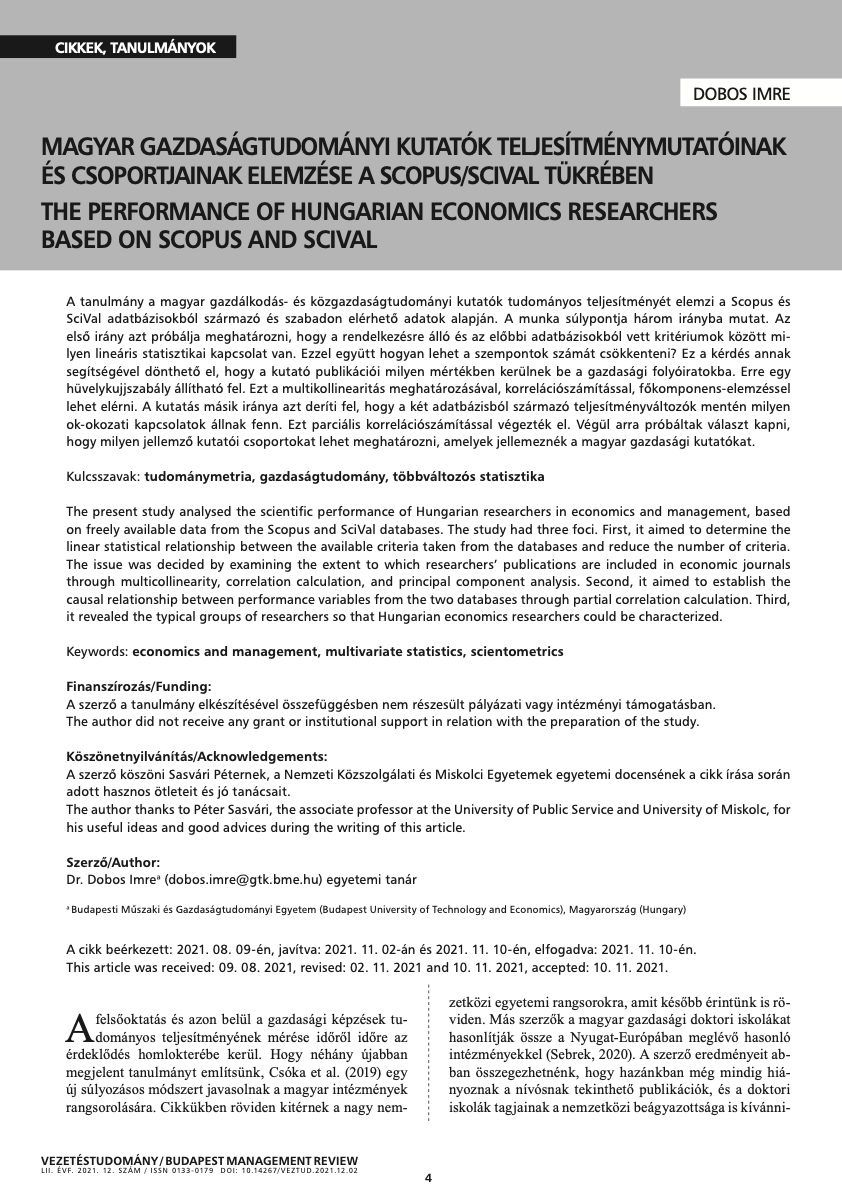Magyar gazdaságtudományi kutatók teljesítménymutatóinak és csoportjainak elemzése a Scopus/SciVal tükrében
DOI:
https://doi.org/10.14267/VEZTUD.2021.12.02Keywords:
economics and management, multivariate statistics, scientometricsAbstract
The present study analysed the scientific performance of Hungarian researchers in economics and management, based on freely available data from the Scopus and SciVal databases. The study had three foci. First, it aimed to determine the linear statistical relationship between the available criteria taken from the databases and reduce the number of criteria. The issue was decided by examining the extent to which researchers’ publications are included in economic journals through multicollinearity, correlation calculation, and principal component analysis. Second, it aimed to establish the causal relationship between performance variables from the two databases through partial correlation calculation. Third, it revealed the typical groups of researchers so that Hungarian economics researchers could be characterized.
Downloads
References
Angelis, L., Bassiliades, N., & Manolopoulos, Y. (2019). On the necessity of multiple university rankings. COLLNET Journal of Scientometrics and Information Management, 13(1), 11-36. https://doi.org/10.1080/09737766.2018.1550043
Csóka, I., Neszveda, G., & Sebestyén, G. (2019). Tudományos teljesítmény mérése a magyar felsőoktatás gazdasági képzéseiben. Közgazdasági Szemle, 66(7-8), 751-770. https://doi.org/10.18414/Ksz.2019.7-8.75
Dobos, I., Michalkó, G., & Sasvári, P. (2020). Messze még a híd? Kelet-Közép-Európa gazdaságtudományi kutatóinak összehasonlítása=A Bridge Too Far? Com- parison of Economics and Management Researchers’ Publication Performance in Central and Eastern Europe. Statisztikai Szemle, 98(8), 981-1000. https://doi.org/10.20311/stat2020.8.hu0981
Dobos, I., Michalkó, G., & Sasvári, P. L. (2021a). The publication performance of Hungarian economics and management researchers: A comparison with the Visegrád 4 countries and Romania. Regional Statistics, 11(2), 165-182. https://doi.org/10.15196/RS110207
Dobos, I., Urbanovics, A., & Sasvári, P. L. (2021b). A visegrádi négyek, Ausztria és Románia gazdaságtudományi publikációs teljesítményének összehasonlító elemzése. Területi Statisztika, 61(6), 739-768. https://doi.org/10.15196/TS610603
Doğan, G., & Al, U. (2018). Is it possible to rank universities using fewer indicators? A study on five international university rankings. Aslib Journal of Information Management, 71(1), 18-37. https://doi.org/10.1108/AJIM-05-2018-0118
Fauzi, M. A., Tan, C. N. L., Daud, M., & Awalludin, M. M. N. (2020). University rankings: A review of methodological flaws. Issues in Educational Research, 30(1), 79-96. http://www.iier.org.au/iier30/fauzi.pdf
Hetesi, E., & Kürtösi, Z. (2009). A felsőoktatás képzési teljesítményének mérési problémái. In: Hetesi E., Majó Z. & Lukovics M. (Eds.), A szolgáltatások világa (pp. 168-185). Szeged: JATEPress.
Lafi, S. Q., & Kaneene, J. B. (1992). An explanation of the use of principal-components analysis to detect and correct for multicollinearity. Preventive Veterinary Medicine, 13(4), 261-275. https://doi.org/10.1016/0167-5877(92)90041-D
Liao, D., & Valliant, R. (2012). Variance inflation factors in the analysis of complex survey data. Survey Meth- odology, 38(1), 53-62. https://www.rti.org/publication/variance-inflation-factors-analysis-complex-survey-data/fulltext.pdf
Mammadli, A. (2021). Global University Rating Indicators and Suggestion For Establishment of Entrepreneur Universities in Azerbaijan. InterConf, (42) 192-210. https://doi.org/10.51582/interconf.19-20.02.2021.016
O’brien, R. M. (2007). A caution regarding rules of thumb for variance inflation factors. Quality & Quantity, 41(5), 673-690. https://doi.org/10.1007/s11135-006-9018-6
Purkayastha, A., Palmaro, E., Falk-Krzesinski, H. J., & Baas, J. (2019). Comparison of two article-level, field-independent citation metrics: Field-Weighted Citation Impact (FWCI) and Relative Citation Ratio (RCR). Journal of Informetrics, 13(2), 635-642. https://doi.org/10.1016/j.joi.2019.03.012
Sebrek, S. S. (2020). A magyar gazdasági felsőoktatás egy nyugati doktori fokozattal rendelkező itthon oktató nézőpontjából – kitörési pontok beazonosítása és egy lehetséges cselekvési terv. Vezetéstudomány, 51(4), 51-62. https://doi.org/10.14267/VEZTUD.2020.04.05
Sheeja, N. K., Mathew, S., & Cherukodan, S. (2018). Impact of scholarly output on university ranking. Global Knowledge, Memory and Communication, 67(3), 154-165. https://doi.org/10.1108/GKMC-11-2017-0087
Simonovits, A. (2004). Publikációs szelekció a közgazdaságtanban. Budapesti Könyvszemle BUKSZ, 16(02), 158-164. https://efolyoirat.oszk.hu/00000/00015/00034/pdf/07simon.pdf
Valentinyi, Á. (2000). A tudomány piaca és a hazai közgazdaságtan. BUKSZ, 12, 144-150.
Vörösmarty, G., & Dobos, I. (2020). A vállalatméret hatása a zöldbeszerzési gyakorlatra. Statisztikai Szemle, 98(4), 301-323. http://doi.org/10.20311/stat2020.4.hu0301

Downloads
Published
How to Cite
Issue
Section
License
Copyright (c) 2021 Vezetéstudomány / Budapest Management Review

This work is licensed under a Creative Commons Attribution 4.0 International License.
Authors assign copyright to Vezetéstudomány / Budapest Management Review. Authors are responsible for permission to reproduce copyright material from other sources.

